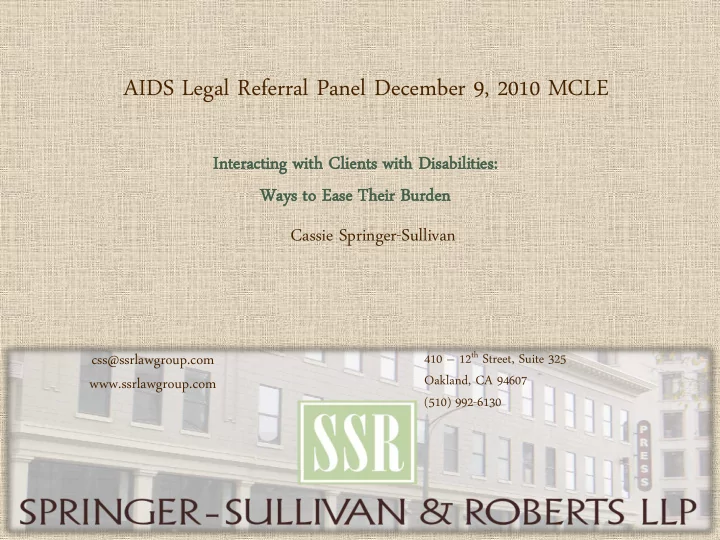

AIDS Legal Referral Panel December 9, 2010 MCLE Inte terac racting ting with th Clients nts with th Disabili abilities: ties: Ways ys to to E Ease Their ir Burden Cassie Springer-Sullivan 410 – 12 th Street, Suite 325 css@ssrlawgroup.com Oakland, CA 94607 www.ssrlawgroup.com (510) 992-6130
A. ERISA Adverse Benefit Decisions Notification of an adverse benefit determination 29 C.F.R. § 2560.503-1(g) -- Every employee benefit plan must: Provide adequate notice in writing when claim is denied; Set forth the specific reasons for such denial, referring to the relevant plan provisions; Describe what information is necessary to perfect the claim and why; Describe the plan’s review procedures and the time limits applicable to such procedures; Describe what internal rules, guidelines, or protocols the administrator relied on in making the adverse decision.
B. Grievance and Appeals Process ERISA requires a “full and fair review.” ERISA § 503. PRACTICE TIP: This Review constitutes your evidence in litigation 29 C.F.R. § 2560.503-1(h) -- Every plan must: Provide claimants the opportunity to submit written comments, documents, records, and other information; Provide that copies of all documents and other information relevant to the claim; Provide for a review that takes into account all comments, documents, records, and other information submitted by the claimant relating to the claim;
B. Grievance and Appeals Process Provide claimants at least 180 days following receipt of a benefit denial to appeal; Provide for a review that does not afford deference to the initial adverse benefit determination; Provide for the identification of medical or vocational experts whose advice was obtained on behalf of the plan in making the adverse benefit determination; If the plan does not follow these statutory requirements, the time limits to appeal are not enforced against the claimant. Counts v. American General Life and Accident Ins. Co. , 111 F.3d 105 (11th Cir. 1997).
C. Initial Communications Listen to the story Attentive Listening – letting down your guard. ‘Attentive listening means giving one’s total and undivided attention to the other person and tells the other that we are interested and concerned. Listening is difficult work that we will not undertake unless we have deep respect and care for the other... we listen not only with our ears, but with our eyes, mind, heart and imagination, as well. We listen to what is going on within ourselves, as well as to what is taking place in the person we are hearing. We listen to the words of the other, but we also listen to the messages buried in the words. We listen to the voice, the appearance, and the body language of the other... We simply try to absorb everything the speaker is saying verbally and nonverbally without adding, subtracting, or amending’. – Psychologist Carl Rogers Communicate like a friend would Bad interruptions and good interruptions
Acti Active ve Listening Listening Tec Techn hnique iques
D. The Retainer Be Prepared to Offer Options so that the Client Retains Some Sense of Control Pro Bono – assure the client of 1 st class citizenship Hourly – offer reduced rates Contingency -- % plus % of futures Contingency -- % plus “risk factor” Contingency – Costs advanced by client Contingency – Costs advanced by law firm Offer Options for Payment Credit Card Payment Plan
E. Communication Put yourself in the client’s shoes to understand the anxiety level. Return calls promptly. Answer legal questions without condescension, yet with patience. Develop a timeline for the case and communicate that with the client (SEE HANDOUT). Be honest when events come up that delay your timeline.
F. The Declaration Be prepared – review information in advance. Tell the client in advance what to expect. Ask open-ended questions to get the story in her own words. Be sympathetic and conversational. Acknowledge the difficulty of the declaration process. Allow opportunity for client revisions.
G. Other Declarations Remember that the client will be reading these documents It does not hurt your case to include statements that lack legal value but possess emotional value to the client
H. Preparing Letters and Documents in the Case Give your client documents to be proud of. Make sure your client has an opportunity for input if she wants it. However, make sure your client trusts you to make the valid legal arguments.
I. Litigation Communicate the expected timeline and process. Communicate the possibility of settlement. Calculate potential settlement recommendations as early as possible to get the client used to the idea (note – the trust-building you have already done helps tremendously here). Send copies of important filings to the client.
I. Litigation (cont.) Hearings Invite the client. Prepare the client for courtroom dress and behavior. Remind the client that the judge may be evaluating her credibility and disability even when she is not on the stand. Sit down for questions and conversation after the hearing.
J. Settlement Prepare the client in advance for what to expect (dress, style, mediator’s techniques). Permit the client to pass you notes while the mediator is present. Permit the client to address opposing counsel if she wants. Talk to the client about disadvantages (taxes, finite money, lack of admission of guilt) as well as advantages to settling. Discuss each offer and demand with the client and value the client’s input. When alone with your client, communicate your human feelings about it (that the money can never compensate them for what they’ve been through). Respect the client’s decision.
Cl Clients ients rea reall lly y do app do apprec reciate iate you w you when hen you you have have trea treated ted the them m with ith respe respect ct an and co d compa mpassion! ssion!
Recommend
More recommend